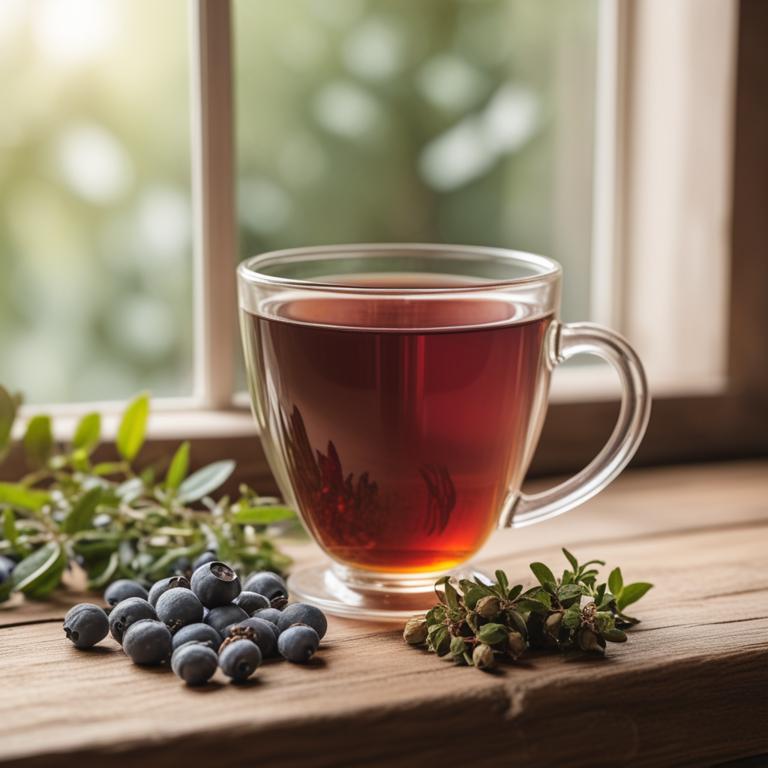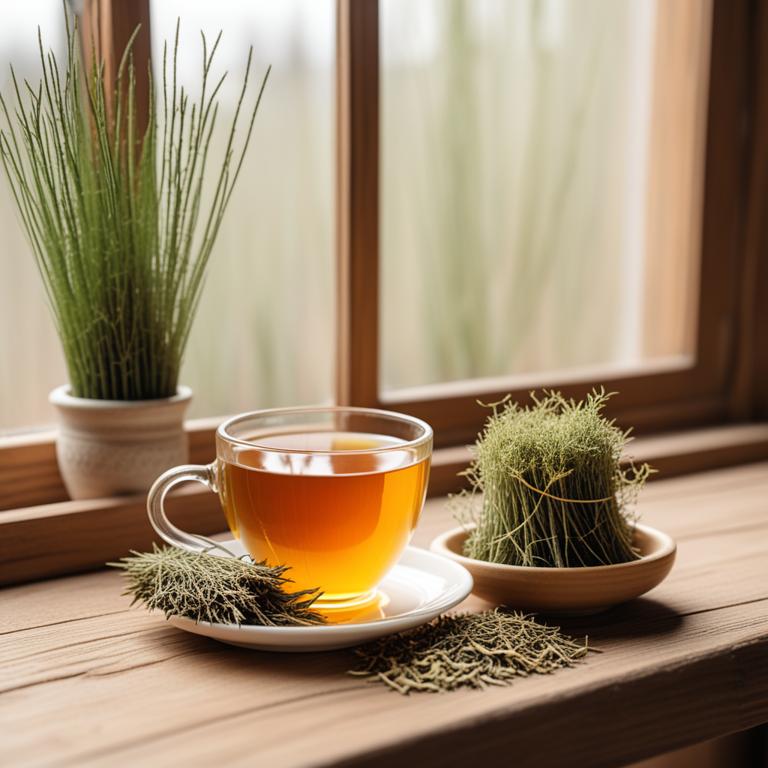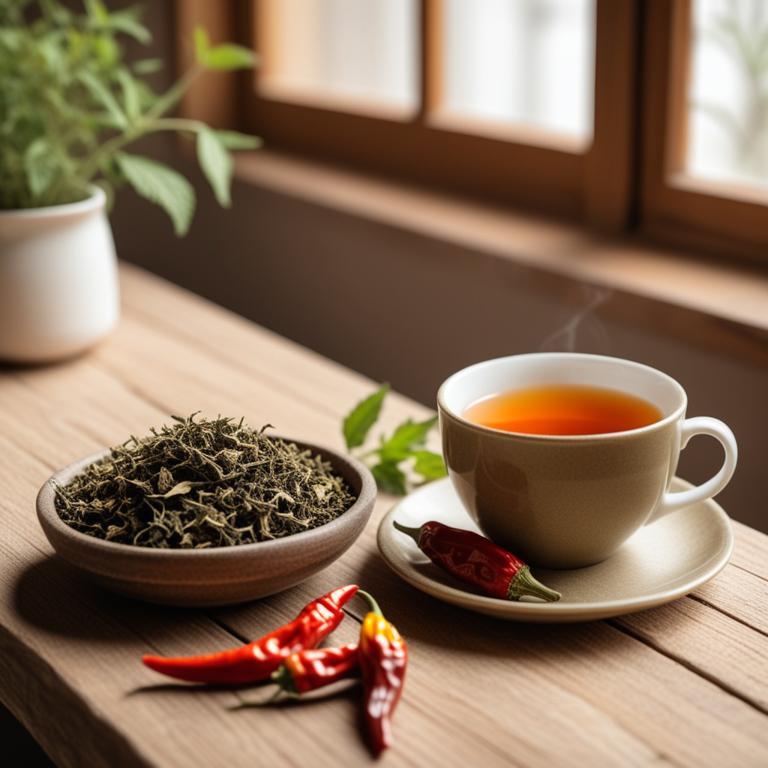10 Herbal Teas For Knee Pain

Herbal teas can be a great way to relieve knee pain, and it's all thanks to their anti-inflammatory and soothing properties.
For example, Curcuma longa, also known as turmeric, contains a powerful compound called curcumin, which has been shown to reduce inflammation and pain in the joints. When you drink turmeric tea, the curcumin is absorbed into your body and starts to work its magic, reducing the swelling and pain in your knee. Another herb that can help with knee pain is Zingiber officinale, or ginger. Ginger has anti-inflammatory properties that can help to reduce pain and inflammation in the joints. It also has a compound called gingerol, which can help to relax the muscles and improve blood flow to the area, reducing pain and stiffness. Drinking ginger tea can be a great way to relieve knee pain and get back to your daily activities. Glycyrrhiza glabra, or licorice root, is another herb that can help with knee pain. It contains a compound called glycyrrhizin, which can help to reduce inflammation and pain in the joints.
It also has anti-oxidant properties that can help to protect your joints from further damage. Drinking licorice root tea can be a great way to soothe your knee pain and promote healing. Drinking herbal teas for knee pain can bring many benefits to your life. Not only can they help to relieve your pain and discomfort, but they can also help to improve your overall health and well-being. By reducing inflammation and promoting healing, herbal teas can help to prevent further damage to your joints and keep you mobile and active. This can be especially helpful for people who have chronic knee pain or are recovering from an injury. Additionally, herbal teas are a natural and non-invasive way to manage your pain, without the risk of side effects or interactions with other medications. You can try combining different herbs to create a tea that is tailored to your specific needs. For example, you could combine turmeric, ginger, and licorice root to create a tea that is both anti-inflammatory and soothing.
You can also add other herbs like peppermint or chamomile to create a tea that is both relaxing and pain-relieving.
- 1. Curcuma longa
- 2. Zingiber officinale
- 3. Glycyrrhiza glabra
- 4. Ginkgo biloba
- 5. Achillea millefolium
- 6. Equisetum arvense
- 7. Capsicum annuum
- 8. Salix alba
- 9. Valeriana officinalis
- 10. Vaccinium myrtillus
1. Curcuma longa

Curcuma longa teas contains a compound called curcumin, which is a powerful anti-inflammatory agent.
Curcumin has potent antioxidant properties that help reduce the production of inflammatory enzymes, such as COX-2 and 5-LOX, in the body. These enzymes are responsible for the production of prostaglandins, which cause pain and swelling in the joints, particularly in the knees. The curcumin in Curcuma longa teas also has a compound called turmerone, which has anti-inflammatory and antioxidant properties.
When consumed regularly, the curcumin and turmerone in Curcuma longa teas may help reduce knee pain by reducing inflammation and oxidative stress in the joints.
- Gather 1 teaspoon of Curcuma longa powder and 1 cup of water.
- Boil the water in a pot or kettle.
- Add the Curcuma longa powder to the boiling water.
- Reduce heat and let it simmer for 5-7 minutes.
- Strain the tea into a cup and drink it while warm.
2. Zingiber officinale

Zingiber officinale teas contains bioactive constituents like gingerols and shogaols.
These compounds have anti-inflammatory properties that help reduce swelling and pain in the knees. The gingerols and shogaols also have analgesic and antispasmodic properties, which ease muscle cramps and spasms that can contribute to knee pain. Additionally, the anti-inflammatory properties of ginger help block the production of pain-causing chemicals in the body.
Regular consumption of Zingiber officinale tea may help alleviate knee pain by reducing inflammation and easing muscle spasms.
- Gather 1 teaspoon of dried Zingiber officinale roots and 1 cup of boiling water.
- Steep the Zingiber officinale roots in boiling water for 5-7 minutes.
- Strain the mixture into a cup using a tea strainer or cheesecloth.
- Add 1 tablespoon of honey to the tea if desired for flavor.
- Drink the tea 2-3 times a day to help alleviate knee pain.
Zingiber Officinale Tea on Amazon
FGO Organic Ginger Tea, 100 Count, Eco-Conscious Tea Bags, Caffeine Free, Packaging May Vary (Pack of 1)
Disclaimer: We earn a commission if you click this link and make a purchase at no additional cost to you.
3. Glycyrrhiza glabra

Glycyrrhiza glabra teas contains compounds like glycyrrhizin and flavonoids, which have anti-inflammatory properties.
These properties help reduce swelling and pain in the knees by blocking the production of chemicals that cause inflammation. The flavonoids also have antioxidant properties, which protect the joints from damage caused by free radicals. Glycyrrhizin, a triterpenoid saponin, inhibits the activity of enzymes that break down cartilage, thereby reducing joint pain and inflammation.
By consuming Glycyrrhiza glabra teas, some people have found relief from knee pain due to its ability to reduce inflammation and protect the joints.
- Gather 1 cup of water and 1 tablespoon of dried Glycyrrhiza glabra root.
- Boil the water in a pot and then turn off the heat.
- Add the dried Glycyrrhiza glabra root to the hot water and let it steep for 5-7 minutes.
- Strain the tea into a cup and discard the root.
- Drink the tea 2-3 times a day for knee pain relief.
4. Ginkgo biloba

Ginkgo biloba teas contains bioactive constituents such as flavonoids, terpenoids, and bilobalide, which work together to provide relief from knee pain.
The flavonoids have anti-inflammatory properties that help reduce swelling and pain in the joints. The terpenoids, specifically ginkgolides, inhibit the production of pro-inflammatory chemicals that contribute to pain and inflammation. Bilobalide, on the other hand, has antioxidant properties that help protect the joints from oxidative stress and damage.
By combining these properties, Ginkgo biloba teas may help alleviate knee pain by reducing inflammation and promoting joint health.
- Gather 1 cup of water, 1 teaspoon of dried Ginkgo biloba leaves, and a tea infuser.
- Boil the water in a pot and let it cool for 1 minute.
- Place the dried Ginkgo biloba leaves in the tea infuser.
- Steep the leaves in the water for 5-7 minutes, then remove the infuser.
- Strain the tea into a cup and drink it hot or cold, 2-3 times a day for knee pain relief.
5. Achillea millefolium

Achillea millefolium teas contains sesquiterpene lactones and triterpene saponins as its bioactive constituents.
These compounds have anti-inflammatory properties that help reduce swelling and pain in the joints. The sesquiterpene lactones, particularly achillin, have been found to inhibit the production of pro-inflammatory enzymes, which contribute to knee pain. Triterpene saponins also exhibit analgesic and anti-inflammatory activities, further alleviating knee pain.
The anti-inflammatory and analgesic properties of Achillea millefolium teas make it a potential remedy for knee pain relief.
- Gather 2 tablespoons of dried Achillea millefolium leaves.
- Measure 1 cup of boiling water and pour it over the leaves in a cup.
- Steep the leaves for 5-7 minutes, then strain the liquid into another cup.
- Add honey to taste, if needed, and mix well.
- Drink the tea 2-3 times a day for knee pain relief.
6. Equisetum arvense

Equisetum arvense teas contains bioactive constituents like silicic acid, flavonoids, and saponins.
These compounds have anti-inflammatory properties, which help reduce swelling and pain in the knees. The silicic acid in Equisetum arvense tea is particularly effective at strengthening connective tissue, such as tendons and ligaments, which can become damaged and cause knee pain. The flavonoids in the tea also have antioxidant properties, which help protect the joints from oxidative stress and inflammation.
By reducing inflammation and strengthening connective tissue, Equisetum arvense tea may provide relief from knee pain by addressing its underlying causes.
- Get 1 cup of fresh or dried Equisetum arvense. You can find it in health food stores or online.
- Use a tablespoon and fill it with the Equisetum arvense. If it's dried, use 2 tablespoons.
- Pour 1 cup of boiling water over the Equisetum arvense in a cup.
- Let it steep for 5-10 minutes. Strain the tea if it's too strong.
- Drink 1/2 cup, 2-3 times a day, for knee pain relief.
7. Capsicum annuum

Capsicum annuum teas contains capsaicin, a key bioactive constituent that helps alleviate knee pain.
Capsaicin has anti-inflammatory properties that reduce swelling and pain in the joints. It works by blocking the production of a chemical called substance P, which transmits pain signals to the brain. Capsaicin also has analgesic and antispasmodic properties, which help relax muscles and reduce stiffness in the knees.
By reducing inflammation and pain, capsaicin in Capsicum annuum teas can provide relief from knee pain.
- Gather 1 cup of fresh or dried Capsicum annuum leaves.
- Boil 1 cup of water in a pot and let it cool for 5 minutes.
- Add 2 tablespoons of fresh or dried Capsicum annuum leaves to the cooled water.
- Steep the mixture for 5-7 minutes, then strain it into a cup.
- Drink the tea 2-3 times a day to help alleviate knee pain.
8. Salix alba

Salix alba teas contains salicin, a compound similar to aspirin, which is responsible for its pain-relieving properties.
Salicin is then converted into salicylic acid in the body, which helps to reduce inflammation and pain in the joints. The anti-inflammatory properties of salicylic acid help to relieve knee pain by reducing swelling and discomfort in the affected area. The flavonoids present in Salix alba teas, such as quercetin and kaempferol, also have anti-inflammatory properties that contribute to its pain-relieving effects.
The combination of salicin and flavonoids in Salix alba teas makes it a potential natural remedy for knee pain.
- Gather 1 cup of dried Salix alba bark, a tea infuser or a coffee filter, and a cup of boiling water.
- Measure out 2 tablespoons of dried Salix alba bark and place it in the tea infuser or coffee filter.
- Steep the Salix alba bark in the boiling water for 5-7 minutes. Let it cool for a minute.
- Strain the tea into a cup and discard the Salix alba bark. You can add honey or lemon to taste.
- Drink the tea 2-3 times a day to help with knee pain. Store any leftover tea in the fridge for up to 24 hours.
9. Valeriana officinalis

Valeriana officinalis teas contains valerenic acid, valepotriates, and isovalerenic acid as its bioactive constituents.
These compounds have anti-inflammatory and analgesic properties, which help to reduce swelling and ease pain in the knees. The flavonoids and alkaloids in Valeriana officinalis teas also have a sedative effect, which can help to relax the muscles and reduce tension around the knee joint. Additionally, the tea's anti-inflammatory properties can help to reduce the production of prostaglandins, which are hormone-like substances that cause pain and inflammation in the body.
By reducing inflammation and relaxing the muscles, Valeriana officinalis teas may provide relief from knee pain.
- Gather 1 cup of boiling water, 1 teaspoon of dried Valeriana officinalis root, and a cup.
- Measure 1 teaspoon of dried Valeriana officinalis root and put it in the cup.
- Pour 1 cup of boiling water over the Valeriana officinalis root in the cup.
- Let the mixture steep for 5-7 minutes, then strain it into another cup.
- Drink the tea 2-3 times a day for knee pain relief.
10. Vaccinium myrtillus

Vaccinium myrtillus teas contains flavonoids, anthocyanins, and phenolic acids, which are powerful antioxidants and anti-inflammatory compounds.
These bioactive constituents help to reduce inflammation in the joints, which is a major contributor to knee pain. Anthocyanins, in particular, have been shown to inhibit the production of pro-inflammatory enzymes, such as COX-2 and LOX, which contribute to joint damage and pain. The anti-inflammatory properties of Vaccinium myrtillus teas also help to reduce oxidative stress and promote the repair of damaged tissues in the knee.
By reducing inflammation and promoting tissue repair, Vaccinium myrtillus teas may help to alleviate knee pain and improve joint function.
- Gather 1 cup of dried Vaccinium myrtillus (blueberry leaf) and 1 cup of water.
- Combine the dried blueberry leaves and water in a saucepan and bring to a boil.
- Reduce heat and let it simmer for 5 minutes.
- Strain the mixture and discard the blueberry leaves. Let it cool.
- Drink 1/2 cup of the tea 2-3 times a day to help with knee pain.